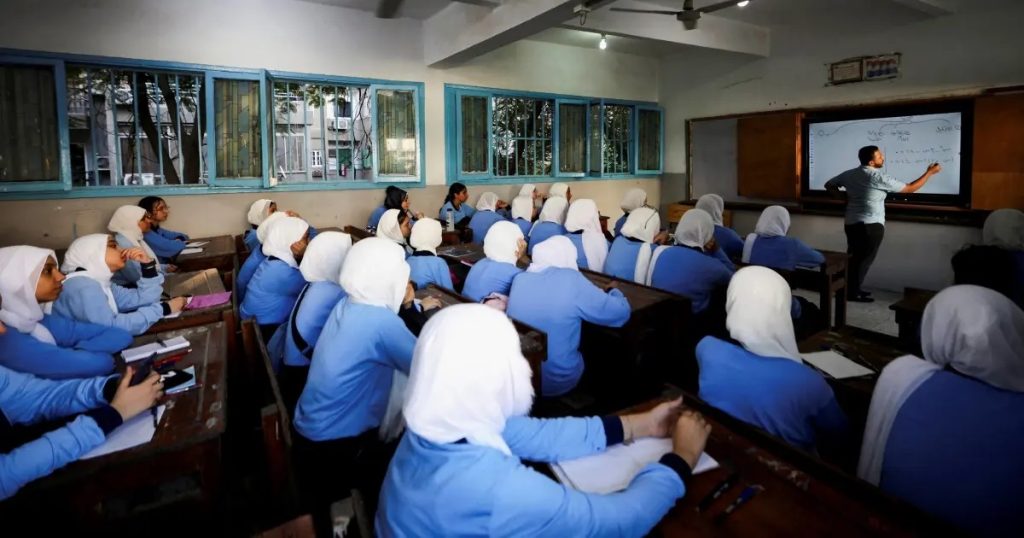WatanEgyptian economists have warned of the worsening public debt and the weak spending on vital sectors like education and health, during a seminar organized by the Conservative Party under the title “A Review of the Final Account for Fiscal Year 2023–2024.”
Elhami Al-Mirghani, an economic expert and Deputy Chairman of the Popular Alliance Party, stated that the primary catastrophe in the state’s final account is the public debt, which has skyrocketed since 2014, becoming a burden that handicaps policymakers.
He explained that debt interest payments reached 2.298 trillion EGP, while debt installments amounted to 2.084 trillion EGP, and new loans represent 53% of the budget, severely shrinking spending on development and essential services.

Egypt’s Soaring Debt and Budget Imbalances Spark Expert and Oppositio Outcry
Al-Mirghani confirmed that the current economic policy has exacerbated the debt crisis, noting that 35% of Egyptians live below the poverty line. Despite a 538% increase in the minimum wage (to 7,000 EGP) and a 498% increase in pensions, these raises have not translated into real purchasing power due to inflation.
He revealed a stark imbalance in spending distribution: general services like Parliament, the Presidency, and the Central Auditing Organization consume 64% of expenditures, leaving only 36% for health, education, and housing. He also pointed out that 59 government economic authorities require restructuring, citing major losses like the 19 billion EGP deficit at the Public Transport Authority, contrasted with surpluses in entities like the Suez Canal Authority and Urban Communities Authority.
Talaat Khalil, rapporteur of the Committee on Public Debt, Budget Deficit, and Financial Reform at the National Dialogue, discussed oversight of the final account, questioning: “Has the current or previous Parliament properly reviewed these figures?” He stressed that the reports from the Central Auditing Organization have become mere formalities, without serious review of loans or expenditures, and highlighted constitutional breaches regarding borrowing limits.
He warned about “unclear numbers” in the budget, such as the unexplained increase in “other revenues” from 299 billion to 902 billion EGP, and the lack of transparency regarding grants — whether from governments or other entities. He also noted the suspicious inflation of the GDP from 5 trillion in 2019 to 14 trillion EGP without clear economic justifications.
Khalil criticized the low investment in critical sectors, with the health budget standing at 191 billion EGP (including only 13 billion for government-funded treatments), and education receiving 184 billion EGP for wages and 267 billion in total expenses.
He also condemned the waste of 12 billion EGP on school meals, awarded to a single company without quality controls.
At the end of the seminar, the experts recommended revising public debt policies, reducing reliance on loans, redistributing the budget toward health, education, and social services, improving data transparency by explaining ambiguous terms like “other revenues” and “subsidies,” and restructuring loss-making economic authorities.
Meanwhile, the Dostour Party expressed strong anger over Parliament’s approval of the final account of the state budget, accusing pro-government MPs of applauding policies that deepen citizens’ suffering.
The party stated that this scene reflects a clear imbalance in the balance of power and oversight and contradicts democratic principles. Official data and accompanying charts show the deteriorating economic situation caused by failed policies that prioritize debt servicing over citizens’ rights.
According to the party, spending on debt has risen from 43.7% in 2015 to 65% in the 2026 budget, while support for subsidies and wages has been halved, highlighting the collapse of governmental priorities.
It warned of further austerity measures in education and ongoing neglect of health spending, which threatens to deteriorate services further and negatively impact citizens’ quality of life.
Egyptian Opposition Slams Parliament for Endorsing Unjust Budget and Ignoring Citizens’ Rights
The party pointed out that the Egyptian Constitution requires allocating 6% of the GDP to education and 3% to health, yet the government has blatantly violated this obligation, dedicating only 1.5% to education and 1.2% to health — a clear disregard for citizens’ rights.
At a time when citizens suffer from inflation, unemployment, and poor services, Parliament’s approval of an unjust budget without real accountability ignores the people’s interests. The party condemned the MPs’ behavior, accusing them of failing in their duty to represent the people and instead becoming tools in the hands of a government that increases burdens on citizens rather than pursuing real reforms.
The party rejected the final account of the state budget entirely, asserting that what happened in Parliament is not true representation of the people but merely the endorsement of policies that intensify citizens’ suffering.
It warned that the continuation of these policies would lead Egypt into deeper crises unless there is genuine review and accountability for those responsible for this collapse.
Finally, the party called on citizens to work toward changing this Parliament — one that disregards their struggles — by participating positively in upcoming elections and choosing true representatives who prioritize citizen interests and actively exercise oversight, aiming to improve living conditions and build a prosperous nation that offers opportunities and a better life for all Egyptians.
Previously, during a general session, Egypt’s Parliament had approved the overall report of the Budget and Planning Committee on the final account for the 2023–2024 state budget, despite objections from opposition MPs who accused the government of wasting public funds and favoring the wealthy over the poor.
Opposition parties blame Egypt’s economic crisis on the government’s reliance on borrowing and spending on ineffective mega-projects.
